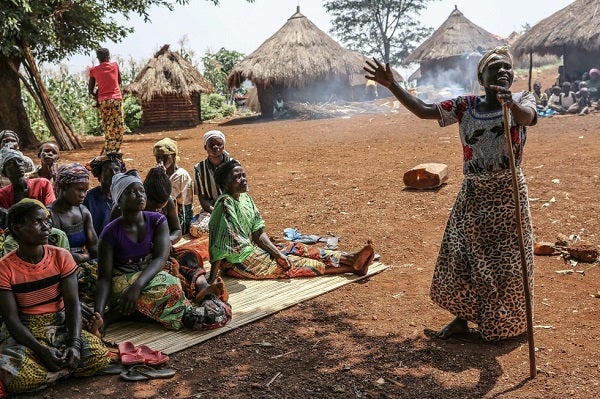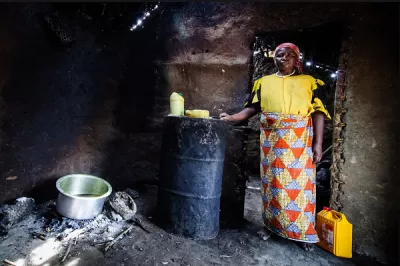Linking Mobile Banking with Village Groups in Uganda
How do we reach out when 85% of the unserved population lives outside recognized urban centers? Many Ugandan banks now offer mobile money links to group accounts, and many offer credit facilities too. However, this type of digital solution can be too expensive or too complicated for people who are transacting locally through groups, in small values, and very frequently. WSBI and PostBank Uganda (PBU) were looking for something that would sustainably address both: encourage active individual savings for group members and provide efficiency gains via an attractive lending offer to the groups.

PBU as a partner under WSBI’s pro-poor micro-savings Programme was dealing with this exact scenario. The bank sought out a way to engage people already using savings and credit groups, estimated to be a very large market that exists outside the reach of formal banking institutions. For instance, WSBI calculated that upwards of $10 million per day was being moved around small villages of Uganda, often through village groups. To effectively digitize these types of transactions within groups, several primary criteria had to fit:
PBU in 2012 started to put in place a dedicated team for promoting the idea of linkage banking for village groups. That team included a chief executive with a vision and a good deal of gut feeling, an experienced linkage banking manager, dedicated village banking field officers, motorcyclists to get out regularly to the groups, motivated regional branch managers and tailored savings and loan products. Further, PBU leveraged innovative software to digitally replicate the steel boxes with triple locks groups use to avoid fraud and control access to their cash-boxes in the village.
PBU’s low-cost VSLA Group Account was born. This account offered customers free weekly deposits and withdrawals matching the group meeting cycle, and zero-cost transfers. The monthly ledger fee was dropped, although aggregator push-and-pull charges continued putting some financial burden on group members, currently at 7 U.S. cents per session for a max of USD 2.50 per transfer from e-wallet to mobile account. These features kept value in a closed loop (member to group, group to member and member to member) and earning PBU a significant margin from a growing funding base coming from small scale savings.
Findings
The response was startling. Within a year 5,000 groups with almost 150,000 members had signed up and group accounts were 95% active. Something interesting was happening: PBU’s retail customer base was growing and the active portion was growing fastest. At the same time, PBU’s funding base was growing with smallest savings balances coming from individual accounts and higher savings balances coming from group accounts. The growing small scale savings funding base led to an imputed income of more than USD 400,000 by end of 2014.
By late 2015, the bank had signed up 28,000 groups with more than 500,000 members. By then, PBU also had an active overall customer base of almost half a million accounts with 60% of these active, small-balance accounts with and average balance of around USD 35 increased six-fold. With the group business bringing in valuable funding and a reduction in fixed costs per client, PBU’s goal is to have groups and their individual members constitute 50% of the bank’s business by 2018.
The bank’s journey towards customer centricity will continue to depend on channel and product innovation. With the Central Bank of Uganda’s approval of the new agent banking regulation, the groups are becoming potential agents, multiplying PBU’s customer acquisition points for serving the mass market and generating additional income for the groups and their members with a particular focus on youth and women. With a redesigned, technology-driven youth product in place, PBU has just started stretching its linkage offer to other 475 youth groups under a newly established partnership between PBU, Airtel and Care Uganda. The most recent product innovation encourages female household members to join the bank by offering an individual “women in progress” account attached to the group account.




Comments
The Women's Microfinance
The Women's Microfinance Initiative (WMI) has been working with PBU since 2010 to bring regulated financial services to the hundreds of rural women's loan groups WMI has organized throughout Uganda. Partnering PBU's banking skills with the village- level funding, training and support that WMI provides has allowed WMI to launch thousands of women into small business operations, which has in turn helped raise the household living standards for tens of thousands of family members across the country. PBU is developing an expertise in rural banking that is providing critical financial interface services so that other non/profits like WMI can innovate programs that effectively provide financial inclusion for the rural poor.
This initiative is the one
This initiative is the one Uganda needs now that a big percentage of our people live in rural areas. A big percentage (74) percent still bank informally..fin scope 2013. The bill to regulate the sector is approved by the Parliament. Thanks to all who made it a success!
Go PBU, we salute you for the big role you are handling in mitigating the negative effects of financial exclusion. Other banks should, too.
Add new comment